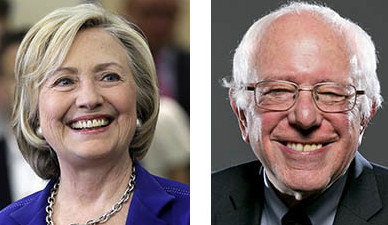WASHINGTON – Hillary Rodham Clinton says she always expected tough competition in the Democratic presidential primary. It’s likely she didn’t expect it would come from Bernie Sanders, the rumpled independent senator from Vermont and a self-described democratic socialist calling for “political revolution.”
The surprise rivalry between Clinton and Sanders will be at the forefront as Democrats take the stage Tuesday in Las Vegas for the party’s first debate of the 2016 campaign. The senator and the former secretary of state will be joined by a trio of candidates who occupy the basement of early polls, each looking to change their fortunes with a breakout moment in prime time.
The debate will begin at 9 p.m. Eastern time on CNN, which is channel 38 on Time Warner Cable in Portland.
For months, Clinton and Sanders have circled each other cautiously and avoided personal attacks. But in recent days, both have shown that their preference to focus on policy doesn’t mean they won’t find ways to jab at each other.
Sanders, who has filled arenas with crowds in the thousands and matched Clinton’s fundraising take in the past three months, has cast the former secretary of state as a late-comer to the liberal positions he’s held for decades on education, the environment and the economy.
After Clinton announced her opposition to a sweeping Pacific Rim trade deal, a pact she had previously called the “gold standard,” Sanders said he was glad she’d come to that conclusion. Then he added: “This is a conclusion I reached on day one.”
Indeed, Clinton has increasingly moved to the left on domestic policy since announcing her campaign this spring, including voicing opposition to the Keystone XL oil pipeline and support for expansive gun control legislation. While she rarely mentions Sanders by name, she’s suggested her proposals are more realistic and well-formed than those espoused by the Vermont senator.

In this Oct. 7, 2015 file photo, Democratic presidential candidate Hillary Rodham Clinton speaks in Council Bluffs, Iowa.
In an interview with NBC’s “Today Show” last week, Clinton took aim at Sanders call for free college tuition, a popular initiative among progressives.
“I’m a little different from those who say ‘free college for everybody,”‘ Clinton said. “I am not in favor of making college free for Donald Trump’s kids.”
For Clinton, a policy-heavy debate would be a welcome reprieve from the months of focus on her use of personal email and a private server during her four years as secretary of state. The controversy has overshadowed virtually every other aspect of her campaign and contributed to a decline in her standing with voters.
Maria Cardona, a Democratic strategist who worked for Clinton’s failed 2008 White House campaign, said that as long as the email issue doesn’t dominate the debate, “this will be a win for her no matter how you look at it.”
Hanging over Tuesday’s contest will be the shadow of Vice President Joe Biden, who is flirting with a late entry into the Democratic field and is expected to announce his decision within days.
While Biden’s political advisers have been talking to potential staff and donors, he is not expected to upend the debate by revealing his political plans in the hours before the candidates take the stage.
Despite the Biden speculation, the Democratic primary has lacked the drama of the Republican contest and the unexpected rise of Donald Trump. Debate host CNN has already said it expects significantly lower ratings for Tuesday’s debate than the Republican contest the cable channel hosted in late September, which drew an audience of 23 million.
Still, the debate will be the largest audience for Democratic candidates since the primary race began. It’s one of six debates the Democratic National Committee has sanctioned, a point of contention among some candidates seeking more nationally televised events to generate much needed attention.
Leading the push for more debates is Martin O’Malley, the former Maryland governor who sought to be Clinton’s chief rival. O’Malley has been sharply critical of what he sees as Clinton’s flip-flopping on policy and has also said questions about her email use are legitimate.
Democratic strategist Jim Manley said he expected O’Malley to be aggressive in going after Clinton in the debate, mostly because it’s his only chance to draw attention to his own campaign.
“This is a chance for him to establish a rationale for his candidacy, which so far has been missing,” Manley said.
Also on stage will be former Virginia Sen. Jim Webb, a decorated Vietnam veteran who criticized Clinton for her early support of the Iraq war and could push her on her hawkish foreign policy positions Tuesday. Rounding out the five-person field is Lincoln Chafee, the Republican-turned independent-turned Democrat from Rhode Island whose most notable campaign moment thus far was his call for the U.S. to adopt the metric system.
Send questions/comments to the editors.



Success. Please wait for the page to reload. If the page does not reload within 5 seconds, please refresh the page.
Enter your email and password to access comments.
Hi, to comment on stories you must . This profile is in addition to your subscription and website login.
Already have a commenting profile? .
Invalid username/password.
Please check your email to confirm and complete your registration.
Only subscribers are eligible to post comments. Please subscribe or login first for digital access. Here’s why.
Use the form below to reset your password. When you've submitted your account email, we will send an email with a reset code.